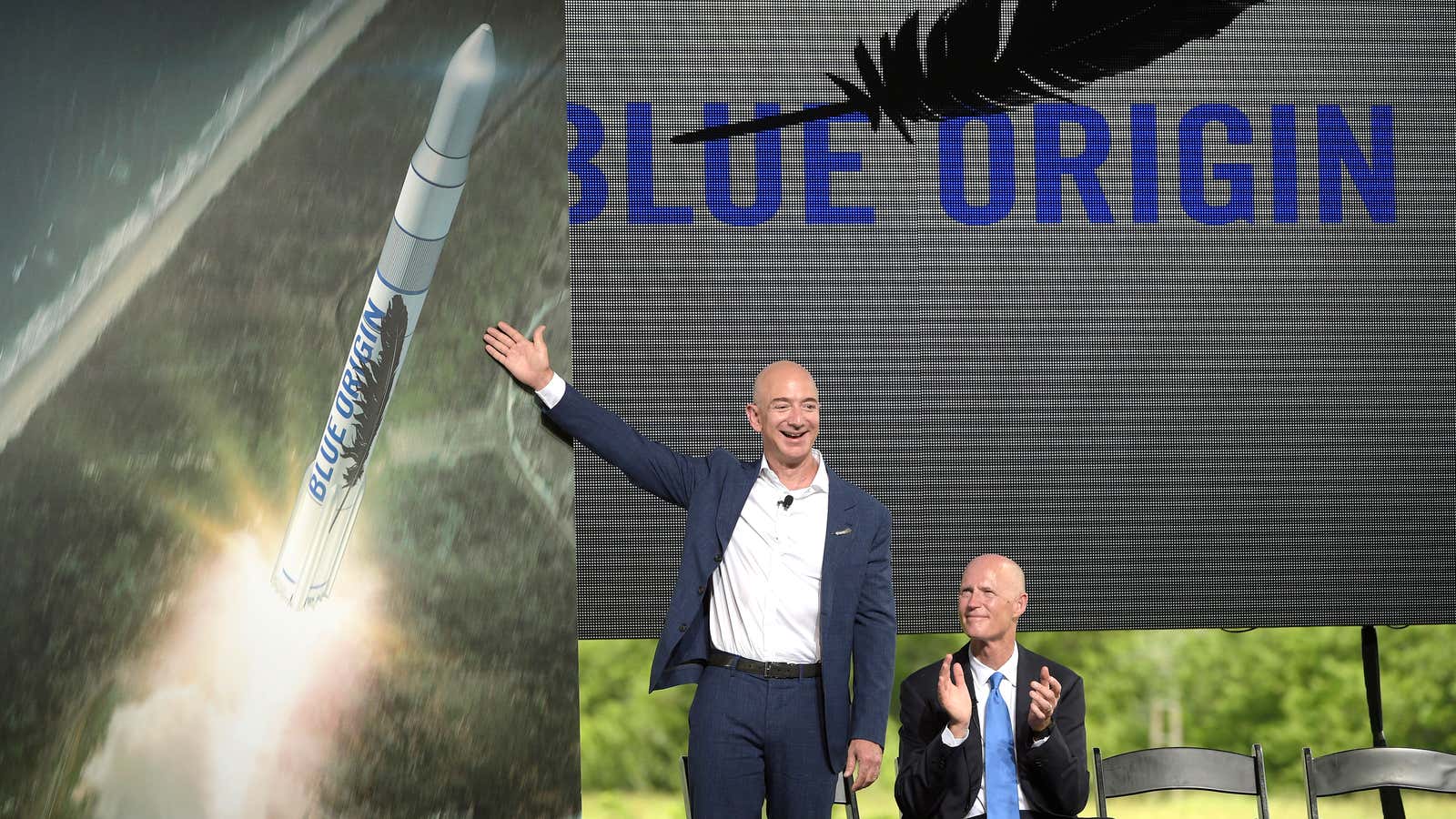The world’s richest man is going to work for the military-industrial complex again, but this time he’s making hardware.
Jeff Bezos’s space company Blue Origin has won a multibillion-dollar contract to build rocket engines for the next-generation rocket being built by United Launch Alliance, a joint venture of Boeing and Lockheed Martin. Amazon, the Bezos-founded internet giant whose profits fund Blue Origin, is already a key software contractor for the US Department of Defense.
This is the first major business undertaken by Blue Origin, one of the companies changing what humans do in space. So far, it’s been focused on developing a small rocket intended to launch tourists to the edge of space.
“United Launch Alliance is the premier launch service provider for national security missions, and we’re thrilled to be part of their team and that mission,” Blue Origin CEO Bob Smith said in a statement.
The Wall Street Journal first reported the decision (paywall), which industry sources confirmed to Quartz.
ULA’s decision to partner with Blue Origin and its BE-4 engine comes at the expense of Aerojet Rocketdyne, the venerable maker of spacecraft propulsion systems, which was also competing to make the most vital component of the new rocket, called Vulcan Centaur. Ars Technica reported this week that Aerojet has stopped spending money on the engine, though the company says it will still have an engine ready to demonstrate next year.
Blue Origin was long seen as the front-runner in the competition, particularly after a ULA executive was secretly recorded speaking candidly about the competition.
“We’re sitting here as a groom with two possible brides,” ULA vice president Brett Tobey said in 2016. “We’ve got Blue Origin over here, the super-rich girl, then we’ve got this poor girl over here in Aerojet Rocketdyne… the chances of Aerojet Rocketdyne coming in and beating the billionaire is pretty low.”
The alliance between the deep-pocketed Bezos and ULA will present a new level of competition to SpaceX, the rocket maker founded by Elon Musk. Since debuting its Falcon 9 rocket in 2010, SpaceX has deeply undercut ULA on price, winning a broad share of commercial contracts and breaking ULA’s monopoly on national security launches undertaken for the US government.
Vulcan Centaur is intended to compete with the Falcon 9 on both cost and capability. While ULA’s current rockets, the Atlas V and the Delta IV, boast high levels of reliability, they can cost $50 million or more than SpaceX’s offering. Blue Origin will help the company achieve this goal because it funded the development of the new engine, called BE-4, almost entirely with internal funding, according to former ULA executives.
Engines are the most expensive and challenging part of any rocket development project, and outsourcing them will mean ULA can offer the rocket itself far more cheaply. Still, the reusable first stage on the Falcon 9 could allow SpaceX to drive down costs even further when the Vulcan debuts in 2020, though that date could slip. Vulcan is expected to eventually start reusing its engines and potentially second stages, but it will not be able to do so until several years after its first flight.
That highlights a different risk to ULA: Blue Origin is also developing its own reusable orbital rocket, called the New Glenn, that is expected to begin flight in 2022. That rocket will be a direct competitor with the Vulcan to launch commercial and government satellites—and is also powered by the BE-4. In one sense, the deal will mean ULA is funding and sharing expertise with another deep-pocked competitor. The difficulty of that choice highlights the competition generated by SpaceX.
“There is no way that ULA would have considered buying engines from Blue Origin except for the pressure that SpaceX put on them,” SpaceX propulsion guru Tom Mueller said last year.
